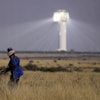NIAGARA FALLS, N.Y. (AP) — Niagara Falls has gone on record against treating wastewater from hydraulic fracturing, with elected officials saying they don't want the city that endured the Love Canal toxic waste crisis to be a test case for the technology used in gas drilling operations.
The City Council approved an ordinance Monday that prohibits natural gas extraction in Niagara Falls, as well as the "storage, transfer, treatment or disposal of natural gas exploration and production wastes."
The move is meant to head off action by the Niagara Falls Water Board, which has been exploring the idea of accepting and treating wastewater from out-of-town hydraulic fracturing operations as a way to offset declining revenues. The city's specialized plant was designed to handle chemical waste and has the capacity to takewastewater from gas drilling.
"I researched it and it just came to a point where money can't be everything," Councilman Glenn Choolokian, the measure's sponsor and a member of the water board, said Tuesday. "We can't be a test case. We've been through Love Canal. We don't want another Love Canal."
An entire neighborhood was emptied in the 1970s after toxins dumped into an abandoned canal in the 1940s and '50s by Hooker Chemicals and Plastics Corp. were found to have seeped into basements and backyards. That created a panic over birth defects and cancer. President Jimmy Carter declared a federal emergency in 1978, and in 1980 the Superfund cleanup act was born.
"We're not selling out future generations of our children for corporate greed," said Council Chairman Sam Fruscione, who attended school in the Love Canal neighborhood as a child.
Hydraulic fracturing uses pressurized water, sand and chemicals to break up underground shale to release natural gas. The wastewater from the process is contaminated with traces of chemicals that are known or probable carcinogens. During the process, drilling operators capture the wastewater and store it elsewhere.
City council members said they took the action Monday to discourage closed-door talks they believe have taken place between water board members and corporations involved with gas drilling.
The council's passage of the ordinance drew a standing ovation from an audience of environmental activists and residents who expressed concerns that tanker trucks with hazardous wastewater would be rolling through the city or treated wastewater would be discharged into the Niagara River upstream from Niagara Falls.
"It doesn't only affect them and their residents, it affects communities downstream," said Rita Yelda of Food and Water Watch, which praised passage of the resolution.
Although the Niagara Falls Water Board, which owns and operates the wastewater treatment systems, is a public benefit corporation and not under direct control of the City Council, council members said they were confident the city's new prohibition against storing and transporting the wastewater will eliminate any possibility of the board moving forward with treatment plans.
"They'll have to helicopter the waste in," Fruscione said.
Earl Wells, a spokesman for the water board, said the ordinance was under review by legal counsel.
Neighboring Pennsylvania is the center of hydraulic fracturing activity, with more than 3,000 wells drilled in the past three years and thousands more planned. In that state, researchers have found increased levels of bromide in rivers used for gas wastewater disposal.
Bromide, when combined with chlorine in municipal drinking water supplies, produces trihalomethanes, which have been linked in some studies to increased human cancer rates after years of exposure.
The council Monday also passed a resolution urging Gov. Andrew Cuomo to ban hydraulic fracturing statewide pending further review by federal environmental officials.
On Tuesday, the Buffalo Common Council passed a resolution supporting state legislation to prohibit hydraulic fracturing and the treatment of its wastewater in the state. The council sent a letter to Cuomo calling for a statewide ban on the drilling.





















